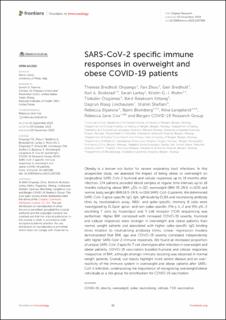| dc.contributor.author | Onyango, Therese Bredholt | |
| dc.contributor.author | Zhou, Fan | |
| dc.contributor.author | Bredholt, Geir | |
| dc.contributor.author | Brokstad, Karl Albert | |
| dc.contributor.author | Jalloh, Sarah Larteley Lartey | |
| dc.contributor.author | Mohn, Kristin Greve-Isdahl | |
| dc.contributor.author | Özgümüs, Türküler | |
| dc.contributor.author | Kittang, Bård Reiakvam | |
| dc.contributor.author | Linchausen, Dagrun Waag | |
| dc.contributor.author | Shafiani, Shahin | |
| dc.contributor.author | Elyanow, Rebecca | |
| dc.contributor.author | Blomberg, Bjørn | |
| dc.contributor.author | Langeland, Nina | |
| dc.contributor.author | Cox, Rebecca Jane | |
| dc.date.accessioned | 2024-04-17T12:19:18Z | |
| dc.date.available | 2024-04-17T12:19:18Z | |
| dc.date.created | 2023-12-05T09:21:13Z | |
| dc.date.issued | 2023 | |
| dc.identifier.issn | 1664-3224 | |
| dc.identifier.uri | https://hdl.handle.net/11250/3127040 | |
| dc.description.abstract | Obesity is a known risk factor for severe respiratory tract infections. In this prospective study, we assessed the impact of being obese or overweight on longitudinal SARS-CoV-2 humoral and cellular responses up to 18 months after infection. 274 patients provided blood samples at regular time intervals up to 18 months including obese (BMI ≥30, n=32), overweight (BMI 25-29.9, n=103) and normal body weight (BMI 18.5-24.9, n=134) SARS-CoV-2 patients. We determined SARS-CoV-2 spike-specific IgG, IgA, IgM levels by ELISA and neutralising antibody titres by neutralisation assay. RBD- and spike-specific memory B cells were investigated by ELISpot, spike- and non-spike-specific IFN-γ, IL-2 and IFN-γ/IL-2 secreting T cells by FluoroSpot and T cell receptor (TCR) sequencing was performed. Higher BMI correlated with increased COVID-19 severity. Humoral and cellular responses were stronger in overweight and obese patients than normal weight patients and associated with higher spike-specific IgG binding titres relative to neutralising antibody titres. Linear regression models demonstrated that BMI, age and COVID-19 severity correlated independently with higher SARS-CoV-2 immune responses. We found an increased proportion of unique SARS-CoV-2 specific T cell clonotypes after infection in overweight and obese patients. COVID-19 vaccination boosted humoral and cellular responses irrespective of BMI, although stronger immune boosting was observed in normal weight patients. Overall, our results highlight more severe disease and an over-reactivity of the immune system in overweight and obese patients after SARS-CoV-2 infection, underscoring the importance of recognizing overweight/obese individuals as a risk group for prioritisation for COVID-19 vaccination. | en_US |
| dc.language.iso | eng | en_US |
| dc.publisher | Frontiers | en_US |
| dc.rights | Navngivelse 4.0 Internasjonal | * |
| dc.rights.uri | http://creativecommons.org/licenses/by/4.0/deed.no | * |
| dc.title | SARS-CoV-2 specific immune responses in overweight and obese COVID-19 patients | en_US |
| dc.type | Journal article | en_US |
| dc.type | Peer reviewed | en_US |
| dc.description.version | publishedVersion | en_US |
| dc.rights.holder | Copyright 2023 The Author(s) | en_US |
| dc.source.articlenumber | 1287388 | en_US |
| cristin.ispublished | true | |
| cristin.fulltext | original | |
| cristin.qualitycode | 1 | |
| dc.identifier.doi | 10.3389/fimmu.2023.1287388 | |
| dc.identifier.cristin | 2208907 | |
| dc.source.journal | Frontiers in Immunology | en_US |
| dc.identifier.citation | Frontiers in Immunology. 2023, 14, 1287388. | en_US |
| dc.source.volume | 14 | en_US |

